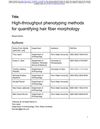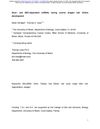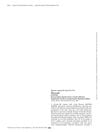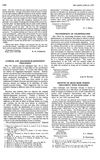 2 citations,
May 2021 in “bioRxiv (Cold Spring Harbor Laboratory)”
2 citations,
May 2021 in “bioRxiv (Cold Spring Harbor Laboratory)” A special foam called EG7 PTK-UR helps heal skin wounds better than other similar materials, working as well as a top-rated product and better than a polyester foam.
 April 2023 in “bioRxiv (Cold Spring Harbor Laboratory)”
April 2023 in “bioRxiv (Cold Spring Harbor Laboratory)” Sweat gland development involves two unique skin cell programs and a temporary skin environment.
[object Object]  August 2024 in “bioRxiv (Cold Spring Harbor Laboratory)”
August 2024 in “bioRxiv (Cold Spring Harbor Laboratory)” A new method using special materials can help regrow hair by creating small wounds.
 1 citations,
March 2018 in “bioRxiv (Cold Spring Harbor Laboratory)”
1 citations,
March 2018 in “bioRxiv (Cold Spring Harbor Laboratory)” The hair treatment made hair grow faster and thicker and strengthened the hair roots.
1 citations,
March 2021 in “medRxiv (Cold Spring Harbor Laboratory)” Many males in Jordan misuse oral contraceptive pills for hair growth, muscle gain, and acne treatment.
 3 citations,
February 2021 in “bioRxiv (Cold Spring Harbor Laboratory)”
3 citations,
February 2021 in “bioRxiv (Cold Spring Harbor Laboratory)” Adult esophageal cells can start to become like skin cells, with a key pathway influencing this change.
 November 2023 in “bioRxiv (Cold Spring Harbor Laboratory)”
November 2023 in “bioRxiv (Cold Spring Harbor Laboratory)” Scientists made a mouse that shows how a specific protein in the skin changes and affects hair growth and shape.
 1 citations,
August 2023 in “bioRxiv (Cold Spring Harbor Laboratory)”
1 citations,
August 2023 in “bioRxiv (Cold Spring Harbor Laboratory)” The research created a detailed map of skin cells, showing that certain cells in basal cell carcinoma may come from hair follicles and could help the cancer grow.
 March 2021 in “bioRxiv (Cold Spring Harbor Laboratory)”
March 2021 in “bioRxiv (Cold Spring Harbor Laboratory)” A specific immune response helps control mite populations on the skin, maintaining healthy hair follicles.
 1 citations,
August 2023 in “bioRxiv (Cold Spring Harbor Laboratory)”
1 citations,
August 2023 in “bioRxiv (Cold Spring Harbor Laboratory)” Certain cells in the adult mouse ear come from cranial neural crest cells, but muscle and hair cells do not.
 1 citations,
November 2018 in “bioRxiv (Cold Spring Harbor Laboratory)”
1 citations,
November 2018 in “bioRxiv (Cold Spring Harbor Laboratory)” Signals from skin cells controlled by Rac proteins help turn certain precursor cells into white fat cells.
 1 citations,
November 2020 in “bioRxiv (Cold Spring Harbor Laboratory)”
1 citations,
November 2020 in “bioRxiv (Cold Spring Harbor Laboratory)” Quantifying hair shape is better than using racial categories for understanding hair characteristics.
 July 2023 in “bioRxiv (Cold Spring Harbor Laboratory)”
July 2023 in “bioRxiv (Cold Spring Harbor Laboratory)” Chitosan slows root hair growth and causes a buildup of callose at low concentrations, but at high concentrations, it only inhibits growth without callose buildup.
 November 2020 in “bioRxiv (Cold Spring Harbor Laboratory)”
November 2020 in “bioRxiv (Cold Spring Harbor Laboratory)” Ezh2 controls skin development by balancing signals for dermal and epidermal growth.
 1 citations,
January 2020 in “bioRxiv (Cold Spring Harbor Laboratory)”
1 citations,
January 2020 in “bioRxiv (Cold Spring Harbor Laboratory)” Dicer is crucial for hair growth in mice.
 February 2024 in “bioRxiv (Cold Spring Harbor Laboratory)”
February 2024 in “bioRxiv (Cold Spring Harbor Laboratory)” Tandem repeats significantly influence hair color, especially darker shades, across different ancestries.
 September 2023 in “bioRxiv (Cold Spring Harbor Laboratory)”
September 2023 in “bioRxiv (Cold Spring Harbor Laboratory)” Freezing gamma-irradiated amniotic fluid may help hair growth and speed up the growth phase.
 March 2024 in “medRxiv (Cold Spring Harbor Laboratory)”
March 2024 in “medRxiv (Cold Spring Harbor Laboratory)” Recent selection on immune response genes was identified across seven ethnicities.
April 2021 in “bioRxiv (Cold Spring Harbor Laboratory)”  December 2020 in “bioRxiv (Cold Spring Harbor Laboratory)”
December 2020 in “bioRxiv (Cold Spring Harbor Laboratory)” Stress can cause a type of hair loss in mice lacking the CCHCR1 gene.
 5 citations,
March 2023 in “bioRxiv (Cold Spring Harbor Laboratory)”
5 citations,
March 2023 in “bioRxiv (Cold Spring Harbor Laboratory)” Dynamic, light touch is sensed through a common mechanism involving Piezo2 channels in sensory axons.
 April 2018 in “bioRxiv (Cold Spring Harbor Laboratory)”
April 2018 in “bioRxiv (Cold Spring Harbor Laboratory)” Certain small molecules can help regrow hair by turning on the body's cell cleanup process.
March 2020 in “bioRxiv (Cold Spring Harbor Laboratory)” Health issues in retired breeder guinea pigs don't affect experiment success.
 February 2024 in “medRxiv (Cold Spring Harbor Laboratory)”
February 2024 in “medRxiv (Cold Spring Harbor Laboratory)” The study aims to understand how mood, physical activity, light exposure, and seasonal changes affect sleep patterns.
 January 1953 in “The Lancet”
January 1953 in “The Lancet” Alopecia areata's causes are unclear, treatments exist but relapses are common.
4 citations,
December 2021 in “Dermatologic Therapy” Mesotherapy for hair loss can cause temporary forehead swelling.
[object Object]  November 2022 in “Journal of the Endocrine Society”
November 2022 in “Journal of the Endocrine Society” Excessive iodine from a cystic fibrosis supplement can cause hypothyroidism.

A bald man grew hair on his head after taking a drug called diazoxide, but lost it again when he stopped the medication.
 4 citations,
July 2022 in “Frontiers in Cell and Developmental Biology”
4 citations,
July 2022 in “Frontiers in Cell and Developmental Biology” The document concludes that understanding adult stem cells and their environments can help improve skin regeneration in the future.
46 citations,
June 2013 in “Journal of structural biology” High glycine–tyrosine keratin-associated proteins help make hair strong and maintain its shape.
























